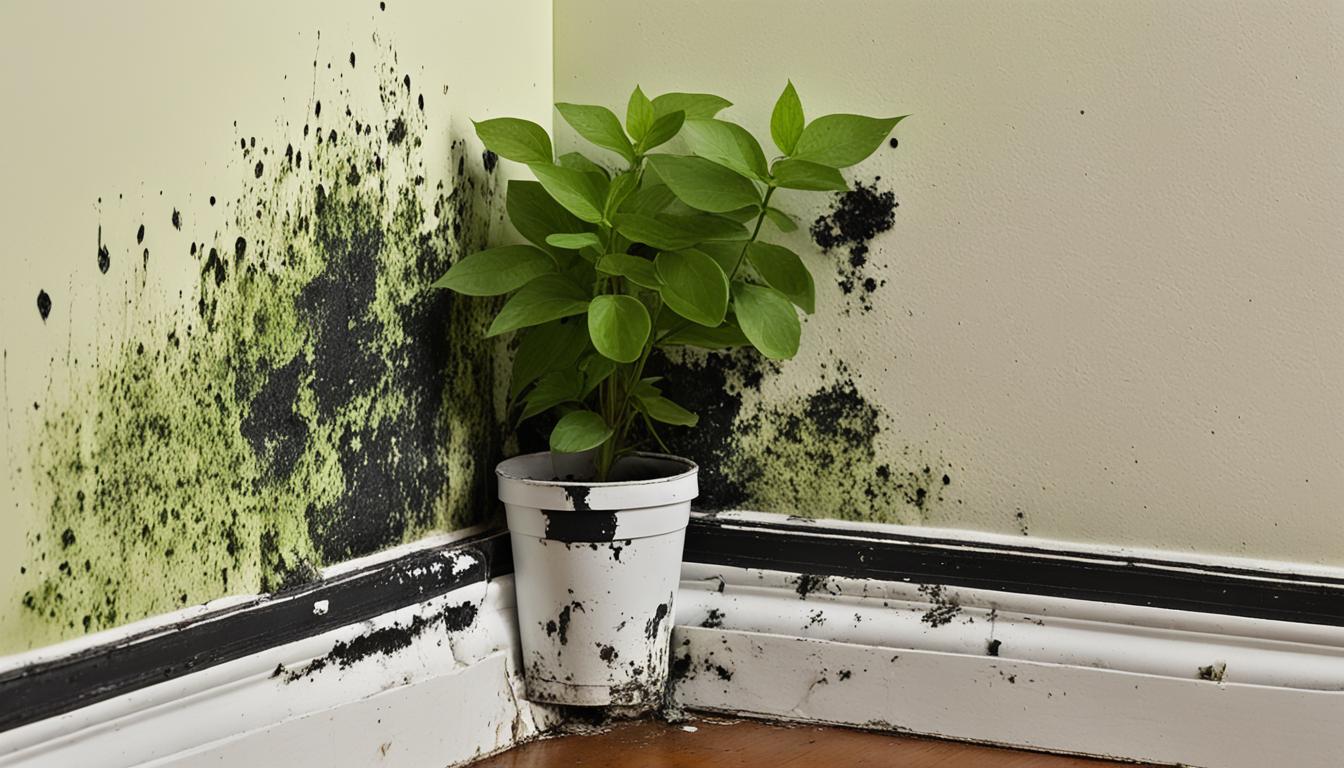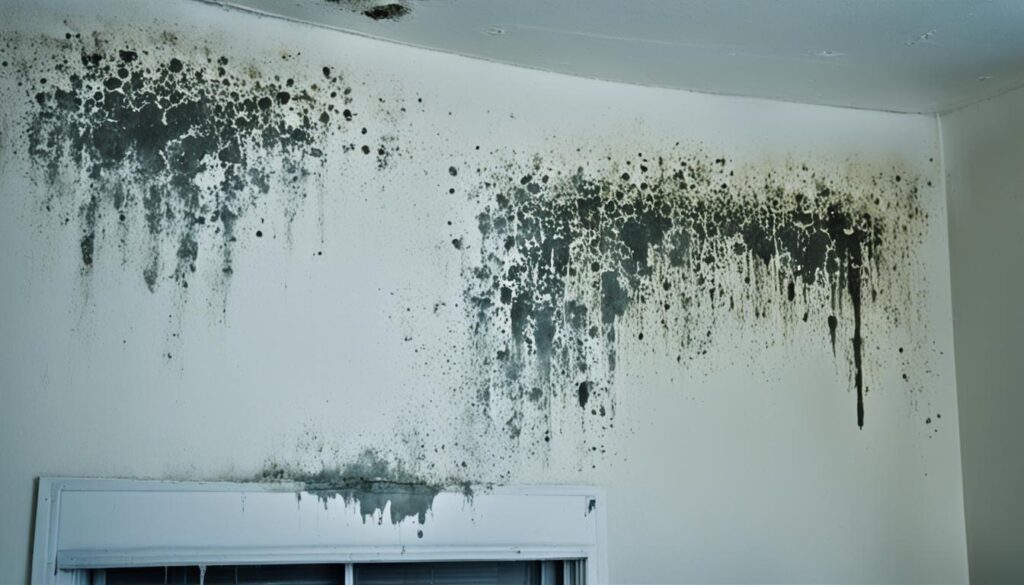
Tenant Mold Issue: Landlord Rights & Duties
Welcome to our comprehensive guide on tenant mold issues and the responsibilities of landlords. In this article, we will explore the rights and duties of both tenants and landlords when it comes to mold problems in rental apartments. Mold exposure in rental properties can pose health risks, making it essential to understand the role of landlords in preventing and addressing mold issues.
As a tenant, it’s crucial to know your rights regarding mold in your apartment and be aware of the actions your landlord should take to ensure your safety and well-being. On the other hand, landlords must understand their responsibilities in providing a habitable environment for their tenants, including addressing any mold-related concerns.
Key Takeaways:
- Tenant mold in apartments can pose health risks and should be taken seriously by both tenants and landlords.
- Landlords have a legal duty to provide safe and healthy living conditions, which includes addressing mold issues.
- Tenants have rights to a mold-free rental property and are encouraged to report any visible or suspected mold problems to their landlord.
- Landlords should promptly investigate and address mold issues, including conducting professional mold inspections if necessary.
- Open communication between tenants and landlords is essential in resolving mold problems effectively and maintaining a healthy living environment.
Landlord Responsibilities for Mold in Rental Properties
When it comes to mold in rental properties, landlords have specific responsibilities and duties to ensure the health and safety of their tenants. Mold growth can pose serious health risks and can lead to costly repairs if left unaddressed. In this section, we will outline the importance of mold disclosure in rental agreements and highlight the steps landlords should take to prevent and address mold issues.
Mold Disclosure in Rental Agreements
One crucial aspect of landlord duties for mold is the inclusion of mold disclosure in rental agreements. By clearly stating in the agreement the potential presence of mold and the tenant’s responsibility to promptly report any mold-related concerns, landlords can educate tenants about the issue and protect themselves legally.
“It is important for landlords to disclose the possibility of mold in the rental property. This allows tenants to make informed decisions and take necessary precautions.”
In addition to mold disclosure, landlords should also include information regarding their commitment to addressing mold issues promptly. This demonstrates the landlord’s dedication to providing a safe and healthy living environment for their tenants.
Preventing and Addressing Mold Issues
Landlords have a duty to take proactive measures to prevent mold growth in their rental properties. Regular property inspections, properly maintaining ventilation and moisture control systems, and promptly addressing any water leaks or plumbing issues are crucial steps in mold prevention.
Should mold issues arise, landlords must take swift action to address them. Hiring professional mold remediation services, such as Fix Mold Miami, can ensure the proper identification, removal, and remediation of mold in rental properties.
Summary of Landlord Responsibilities for Mold
Landlords have a legal and ethical obligation to protect their tenants from mold-related health risks. This includes:
- Disclosing the possibility of mold in rental agreements
- Educating and informing tenants about the health risks associated with mold exposure
- Taking preventive measures to minimize mold growth
- Promptly addressing and resolving any mold issues
By fulfilling these responsibilities, landlords can create a safe and healthy living environment for their tenants and reduce the risk of legal disputes and costly repairs.
Tenant Rights Regarding Mold in Apartments
Tenants facing mold problems in their apartments have certain rights that protect their health concerns and provide avenues for seeking resolution. Mold exposure in rental properties can pose significant risks to tenants’ well-being, and it is essential for them to be aware of their rights and take appropriate actions.
Tenant health concerns regarding mold should not be taken lightly, as exposure to mold can lead to various health issues, including respiratory problems, allergies, and even infections. To protect themselves, tenants should be proactive in addressing mold problems and familiarize themselves with their rights.
Here are some important steps tenants can take to protect their health and seek resolution for mold issues:
- Notify the landlord: As soon as tenants notice the presence of mold in their apartments, they should inform their landlord or property manager immediately. Written communication, such as an email or a letter, is advisable to have a documented record.
- Document the problem: Tenants should document the mold problem by taking photos or videos to provide evidence of the extent of the issue. This documentation can be useful when discussing the problem with the landlord or seeking legal assistance if necessary.
- Request an inspection: Tenants have the right to request a professional mold inspection to determine the extent of the mold problem and identify the cause. This inspection can serve as valuable evidence to support their claims.
- Understand lease agreements: Tenants should carefully review their lease agreements to understand the landlord’s responsibilities regarding mold issues. Some leases may include clauses that specifically address mold disclosure, prevention, and remediation.
- Seek legal advice if necessary: If landlords fail to address mold problems within a reasonable amount of time or if the issue poses significant health risks, tenants may need to consult with a lawyer specializing in landlord-tenant disputes to explore their legal options.
It is essential for tenants to be proactive in protecting their health and well-being when facing mold problems in their apartments. By understanding their rights, documenting the issue, and seeking appropriate resolution, tenants can ensure a safe and healthy living environment.
Remember:
Addressing mold problems promptly is crucial to prevent adverse health effects on tenants.

Recognizing Mold Problems in Rental Apartments
In order to effectively address mold issues in rental apartments, it is crucial for both tenants and landlords to be able to recognize the signs of mold growth. Identifying mold problems early on can help prevent further damage to the property and ensure the health and safety of the occupants. Here are some key indicators to look out for:
- Visible mold: One of the most obvious signs of a mold problem is the presence of visible mold growth. It may appear as black, green, or brown patches on walls, ceilings, or other surfaces.
- Musty odor: Mold often emits a distinct musty smell. If you notice an unpleasant and persistent odor in your rental apartment, it could be an indication of mold growth.
- Water damage: Mold thrives in moist environments, so any signs of water damage, such as leaks, damp walls, or water stains, should be taken seriously as they can lead to mold growth.
- Allergic reactions: If tenants or occupants in the rental apartment experience unexplained allergic symptoms like sneezing, coughing, or itchy eyes, it could be a result of mold exposure.
While these indicators can suggest the presence of mold, it’s important to emphasize the significance of professional mold inspections. Professional inspectors have the expertise and tools to assess the extent of mold growth, identify the types of mold present, and recommend appropriate remediation measures.
Importance of Apartment Mold Inspection
Apartment mold inspection plays a critical role in identifying and addressing mold problems in rental properties. It helps to:
- Ensure the health and safety of tenants by identifying and addressing potential mold-related health risks.
- Determine the extent of mold growth and the source of moisture that is supporting its growth.
- Assess the need for mold remediation and provide guidance on the appropriate steps to take.
- Protect the property from further damage by addressing mold issues promptly and effectively.
By conducting regular and thorough mold inspections, landlords can fulfill their responsibility to provide a safe and habitable living environment for their tenants.
Recognizing the signs of mold growth is an essential first step in addressing mold problems in rental apartments. However, professional mold inspections are crucial for accurately assessing the situation and implementing appropriate remediation measures.
Mold Remediation Rights for Tenants
As a tenant, you have the right to a safe and healthy living environment, free from the harmful effects of mold. If you encounter mold issues in your apartment, it’s important to understand your rights and take appropriate action to ensure that the problem is addressed by your landlord.
Here are the steps you can take to assert your mold remediation rights:
- Document the Issue: Take photos or videos of the mold growth in your apartment and keep records of any communication you have with your landlord regarding the issue. This documentation will serve as evidence of the problem.
- Notify Your Landlord: Inform your landlord about the mold problem in writing, preferably through certified mail. Be sure to include details about the extent of the mold growth and any negative health effects you may be experiencing. Request that your landlord takes immediate action to remedy the situation.
- Seek Mold Testing: If your landlord fails to address the mold issue promptly, you may consider arranging for a professional mold assessment. This test will provide you with an accurate evaluation of the mold levels in your apartment and can support your claim for remediation.
- Know Your Local Laws: Familiarize yourself with the tenant mold remediation laws and regulations specific to your state or city. Some jurisdictions have specific requirements regarding the landlord’s responsibility to address mold problems in rental properties.
- Consult with an Attorney: If your landlord refuses to remediate the mold problem despite your efforts, you may want to seek legal advice. An attorney experienced in landlord-tenant disputes can help you understand your rights, negotiate with your landlord, or take legal action if necessary.
Remember, mold can pose serious health risks, such as respiratory issues, allergies, and even long-term health complications. Therefore, it’s crucial to assert your mold remediation rights as a tenant to ensure a safe and healthy living environment.

Case Study: Tenant Mold Remediation Legal Victory
“In a recent landmark case in California, tenant Lisa Johnson took legal action against her landlord due to severe mold issues in her rental apartment. With the help of her attorney, she successfully asserted her mold remediation rights, leading to a court-ordered resolution. This case highlights the significance of tenants understanding and exercising their rights when it comes to mold remediation.”
– Attorney Jonathan Miller
| Tenant’s Rights | Landlord’s Responsibilities |
|---|---|
| Tenants have the right to a safe and healthy living environment. | Landlords are responsible for ensuring a mold-free rental property. |
| Tenants have the right to prompt remediation of mold issues. | Landlords must address mold problems in a timely manner. |
| Tenants can hire a professional for mold assessment. | Landlords should cooperate and respond to professional mold assessments initiated by tenants. |
| Tenants can seek legal assistance if landlords fail to remediate mold issues. | Landlords may be held liable if they neglect their mold remediation responsibilities. |
Engaging Professional Mold Assessment and Remediation Services
When faced with a mold issue in your rental property, it’s crucial to engage professional mold assessment and remediation services for effective and long-term solutions. Mold can cause severe health issues and damage to your property if left unaddressed.
Fix Mold Miami is Florida’s highest-rated company specializing in mold assessments, prevention, and remediation. With years of experience and a team of certified experts, they offer comprehensive solutions to ensure your property is mold-free and safe.
Fix Mold Miami provides a range of services tailored to meet your specific needs. From thorough mold inspections using the latest equipment and techniques to developing customized remediation plans, they have the expertise to handle any mold problem.
Their services include:
- In-depth mold assessments to identify the source and extent of mold growth
- Preventive measures to minimize the risk of mold recurrence
- Efficient mold remediation using safe and environmentally-friendly methods
- Post-remediation testing to ensure successful mold removal
By choosing Fix Mold Miami, you can have peace of mind knowing that your mold issue will be handled professionally and effectively. Their skilled team will work diligently to restore your property to a clean and healthy condition.
“Fix Mold Miami provided exceptional mold remediation services for my rental property. Their attention to detail and thoroughness were truly impressive. I highly recommend their expertise to anyone dealing with mold issues.”
– John Adams, satisfied customer
If you’re experiencing mold problems in your rental property, contact Fix Mold Miami today for a comprehensive assessment and reliable remediation services. Don’t let mold compromise your health and your property’s value.
Health Risks of Mold Exposure in Rental Properties
Exposure to mold in rental properties can pose significant health risks to tenants. Mold growth is a common problem in many apartments and can lead to various health concerns. It is crucial for both landlords and tenants to address mold issues promptly to prevent adverse health effects.
Mold exposure can trigger allergic reactions such as sneezing, coughing, and watery eyes. Individuals with asthma or respiratory conditions may experience worsening symptoms, including difficulty breathing and chest tightness. Prolonged exposure to mold spores can also lead to more severe health problems, including respiratory infections and chronic sinusitis.
Additionally, certain types of mold produce mycotoxins, which can have toxic effects on the human body. These toxins can lead to neurological symptoms, such as headaches, dizziness, and memory problems. Long-term exposure to mycotoxins has been linked to immune system suppression and can even be carcinogenic.
It is important for tenants to be aware of the potential health risks associated with mold exposure in rental properties. If you notice any signs of mold growth or experience unexplained health symptoms, it is crucial to notify your landlord immediately and request mold remediation.
“Exposure to mold in rental properties can pose significant health risks to tenants. Mold growth is a common problem in many apartments and can lead to various health concerns.”
Preventing Health Risks: Tips for Tenants
- Regularly inspect your rental property for any signs of mold, such as musty odors, discoloration on walls or ceilings, or water leaks.
- Keep your living space well-ventilated to reduce moisture levels, as mold thrives in damp environments.
- Report any water leaks or plumbing issues to your landlord promptly to prevent mold growth.
- Use mold-resistant materials for furnishings and decor to minimize the chances of mold growth.
- Ensure proper ventilation in bathrooms and kitchens by using exhaust fans or opening windows.
By taking proactive measures and staying vigilant, tenants can protect themselves from the potential health risks associated with mold exposure in rental properties.
| Health Risks of Mold Exposure | Symptoms |
|---|---|
| Allergic Reactions | Sneezing, coughing, watery eyes |
| Respiratory Issues | Worsening asthma, difficulty breathing, chest tightness |
| Neurological Symptoms | Headaches, dizziness, memory problems |
| Immune Suppression | Increased susceptibility to infections |
| Carcinogenic Effects | Potential cancer risk |
Conclusion
In conclusion, when it comes to tenant mold issues in rental properties, clear communication and shared responsibilities between tenants and landlords are crucial. Landlords have a duty to provide safe and habitable living conditions, including addressing and preventing mold problems. Tenants, on the other hand, have the right to a healthy environment and should promptly report any mold-related concerns to their landlords.
It is important for both parties to understand the potential health risks associated with mold exposure. Mold can cause various health problems, including respiratory issues, allergies, and infections. Therefore, it is imperative that landlords take proactive measures to prevent mold growth and address any existing issues promptly to safeguard the well-being of their tenants.
Engaging professional mold assessment and remediation services, such as Fix Mold Miami, is highly recommended. These experts can provide thorough inspections, preventive measures, and effective remediation, ensuring that mold issues are properly addressed and prevented in the future.
Ultimately, by prioritizing open communication, adhering to responsibilities, and promptly addressing mold problems, landlords and tenants can work together to create a safe and healthy living environment.




